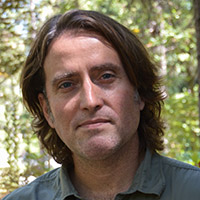A Livable Future for Fisheries

In this episode of Unconfined, Philip Loring discusses practical ways for fishers, grocers, and consumers to contribute to the repair and restoration of global fisheries.

We Are Not Necessarily Toxic and We Can Safeguard the Oceans
By Christine Grillo Subscribe to Host Notes
Industrial production of aquatic foods, combined with an increased global appetite for seafood, has done quite a number on fisheries. Recent research suggests that they’re in even worse shape than we suspected. As we over-fish populations of certain species (we’re looking at you, bluefin tuna), the marine ecosystems that serve as habitat become degraded and are in danger of collapsing. But Philip Loring, a scientist and advocate known for his work in fisheries, believes we can reverse this sad story and find our way toward abundance.
As this episode begins, Loring offers practical advice about how we can change course. And when he says “we,” he casts a wide net, including the world’s fishers, the world’s grocers and food retailers, and those of us who eat seafood. For the most part, his solutions are practical. We should fish in ways that make sense with the season and breeding habits. We should harvest a diversity of fish species instead of prioritizing the most popular species. We should adapt our techniques so that we do less damage to the habitat.
But some of his suggestions aren’t so obvious. He uses avocado and quinoa to illustrate how much influence grocers and food retailers have over what we eat. Did American consumers demand to purchase avocadoes and quinoa in supermarkets? Or did retailers embark on campaigns to create demand for those products in the US? Loring believes it was the latter scenario. And that whatever happened to the avocado and quinoa can happen to fish species that are not overfished. Instead of focusing on tuna, salmon, and shrimp, we consumers can develop a taste for less familiar species.
As we delve into these ideas, Loring gets philosophical, and we talk about some of the ideas in his book, Finding Our Niche: Toward a Restorative Human Ecology (Fernwood Publishing, 2020). It’s almost a therapy session for people who feel guilty about how humans have behaved and what we’ve done to the planet. He addresses the myth about the “human touch,” which says that everything people touch turns bad, and the myth about “wild” and “pristine” places versus civilization. It’s not true, he asserts, that humans have the reverse Midas touch. In fact, there are scores of examples of seemingly “wild” places that people have made better through intentional management and care. One example is prairie grasslands, which humans safeguarded through controlled burns, intentional hunting, and control over bison populations. Another example is marine beach gardens or clam gardens. People created and managed these systems not only for food, but to strengthen the ecosystem for species other than themselves.
Furthermore, people are not outside of nature, but rather one part of nature. We don’t “save” nature. So many of our stories about “saving” emerge from a dusty hero’s journey mindset in which one special person rises above hoi polloi to execute an elaborate, dramatic rescue. Nonsense, he says. Instead of saving, we can—and should—exist in friendship, in good relation with other living things in the world. Instead of thinking of ourselves as saviors, we can think of ourselves as guardians.
He draws from indigenous sources for these ideas, and he credits them wherever and whenever we can. These ideas don’t have any truck with the contemporary understanding of humans as greedy, self-serving, and short-sighted. Indigenous wisdom tells us that humans are capable of stewarding a vibrant, abundant world. Whatever we think of humanity at this moment is just one sliver, one blip from our history: we have done better, and we can do better again.
Toward the end of the episode he quotes Daniel Quinn, an author famous for his environmentally-oriented books Ishmael (1992) and Beyond Civilization (1999), to get across the point that what we are doing now is not indicative of human nature. “We’re not humanity,” said Quinn, “we’re just one culture – one culture out of hundreds of thousands that have lived their vision on this planet and sung their song.”
In Host Notes, the voices behind Unconfined podcast deliver additional context to supplement our interviews. Their views do not necessarily reflect those of the Johns Hopkins Center for a Livable Future or the Johns Hopkins University.